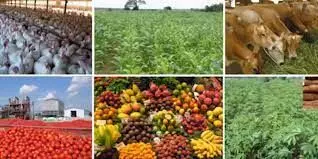- Home
- /
- More
- /
- Agriculture
- /
- Stakeholders call for...
Stakeholders call for standard pricing for agro-produce

Some agriculture stakeholders have called for a standard national pricing system for agro-produce in implementing the Federal Government's ban on direct sale to non-Nigerians.
The stakeholders made the call in different interviews on Monday in Lagos.
They include Mr Godwin Egbebe, Lagos State chairman, Poultry Association of Nigeria (PAN), Dr Tunde Babalola, an agriculture expert, and Mr Ismail Olawale, a fellow at the National Agricultural Extension and Research Liaison Services (NAERLS).
The Federal Executive Council (FEC) on March 9, placed a ban on purchase of agriculture produce at farm gates by non-Nigerians and their representatives.
This now implies that only licensed and duly registered local buying agents can now buy farm produce directly from farmers in Nigeria.
Olawale said the policy was long overdue, but its implementation was key to its success.
He urged the government to set up a standard pricing system for local farmers to adopt, to enable the policy work effectively.
"This is a policy that is coming a bit late but if it can be implemented to the letter, it will be the best for the country.
"However, the government will need to do a lot to make sure that we have a standard National Pricing System, to implement this policy.
"So many local farmers have gotten used to selling to foreigners because of quick cash and continued patronage.
"Most of the farmers have already enjoyed indiscriminate sales and they believe that the system is okay for them because the foreigners are consistent.
"The farmers enjoy hiding such systems to evade being taxed," he said.
Similarly, Babalola called for a detailed plan of action by the government on the implementation of the ban of direct sales of agro-produce.
He noted that the policy could have its advantages and disadvantages.
"Banning the direct sale of agro-produce to foreigners is a protectionist policy.
"The ban will protect the local industries and conserve the resources in Nigeria for the industries to make use of the produce into finished products.
"The policy application will be positive for agro-produce that are not in large quantities locally, we can improve its value-chain and generate more income.
"The policy is advantageous as it can help the sector to develop our local agro-produce value chains.
"The policy can also be negative if we do not have the capacity to utilise or the machinery to improve on the value-chain of perishable agro-produce," Babalola added.
On his part, Egbebe noted that the policy was a welcome development and would be to the benefit of the local farmer.
"We have always called for policies like this for long. This policy will help us have enough raw materials to increase productivity in the sector.
"These foreigners buy this agro-produce in bulk at a cheaper price, hoard it and then sell at higher prices when the commodity is scarce.
"The policy will help to prevent hoarding and stabilise the price of the prices of agro-produce in the country.
"One major hindrance in agri-business is delaying the payment of the farmers.
"There should be a laid down standard for the sale and pricing of agro-produce for local farmers to comply with," Egbebe noted.



